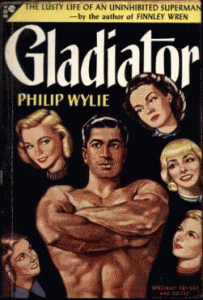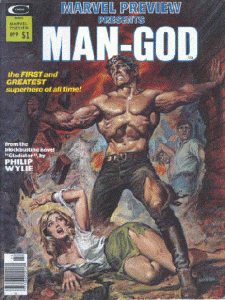 So I believe I mentioned in my Balticon report that I bought a lot of books Memorial Day weekend. Now, by no means am I going to impose any ridiculous rules upon myself to limit book-buying. If you would suggest to me that I should only buy in a year what I can read in a year, or that I shouldn’t be allowed to buy one new book until I finish two others that I already own, well, you’re suppressing my natural joy and impinging upon my creative process! So… well… Shut up!
So I believe I mentioned in my Balticon report that I bought a lot of books Memorial Day weekend. Now, by no means am I going to impose any ridiculous rules upon myself to limit book-buying. If you would suggest to me that I should only buy in a year what I can read in a year, or that I shouldn’t be allowed to buy one new book until I finish two others that I already own, well, you’re suppressing my natural joy and impinging upon my creative process! So… well… Shut up!
But I know I ought to try to be reasonable. Maybe a little. My therapist suggests it’s a good idea, anyway. I therefore have resolved that at least every other book I read should be one that’s been sitting on my shelf for a while. I suppose some would go with an organized process, LIFO or FIFO or some such. I just pick stuff at random. Sometimes I go digging for the zine I bought 30 years ago and forgot to read. Sometimes I just grab something off the library cart that’s sitting in my office…
What?
You don’t have a library cart in your office? How do you shift your books when it’s time to interfile the new ones? How do you… oh, never mind. You’re hopeless!
Yes, I have a library cart in my office.
Shut up.
 The books from Balticon are still on the library cart. So last week I flipped through them and grabbed the first one that spoke to my mood. Since seeing Man of Steel I’ve been craving Superman stories… perhaps because Man of Steel sucked from my mind all notion of what Superman was about and replaced it with falling debris. So the tale of a young man transplanted between planets and sent to gladiator school seemed intriguing. (If only the transplanted between planets part makes sense to you, you need to be aware that Superman was, in part, inspired by Philip Wylie’s novel Gladiator, an enjoyable book that’s not too hard to track down. Blame Roy Thomas that I know this, as he adapted the tale to comics more than once, particularly when he created Iron Munro in the pages of Young All-Stars to take the place of a character who had been written out of a part of comics history. His name was Superman.)
The books from Balticon are still on the library cart. So last week I flipped through them and grabbed the first one that spoke to my mood. Since seeing Man of Steel I’ve been craving Superman stories… perhaps because Man of Steel sucked from my mind all notion of what Superman was about and replaced it with falling debris. So the tale of a young man transplanted between planets and sent to gladiator school seemed intriguing. (If only the transplanted between planets part makes sense to you, you need to be aware that Superman was, in part, inspired by Philip Wylie’s novel Gladiator, an enjoyable book that’s not too hard to track down. Blame Roy Thomas that I know this, as he adapted the tale to comics more than once, particularly when he created Iron Munro in the pages of Young All-Stars to take the place of a character who had been written out of a part of comics history. His name was Superman.)
I found a Superman story all right, in more ways than one. Deliverance-from-the-Void (“Del”) Whitby has grown up on the small colony world Gilead, settled by pacifist religious separatists. They’re gentle farmers, and they’ve taught the boy to love peace. He’s smaller than his fellows, but has amazing reflexes and is much, much faster. When he’s sixteen and reaches what they call “Decision Day,” he learns he’s an alien from another planet who was rocketed to Gilead as a baby. Hence the smaller and faster. It’s never explained what “Decision Day” is for other kids on his planet–one assumes it’s akin to the Amish custom of rumspringa. For Del, it turns out to be “Lack-of-decision” day. You see, he’s got his plan. He’s going to stay right where he is, farm, and marry Cassie, the girl next door. It’s what his people call “the smooth path,” the uneventful life. It’s their moral ideal. He winds up being kidnapped by nasties called Daltrescan slavers and taken to the arena on another planet, where he must triumph in a series of fights to the death in order to win his freedom.
This he now does. Del spends about half the book becoming a gladiator, waxing philosophical about how he’s being forced to kill, but has no choice if he’s to live and make it home to Gilead, where he will marry Cassie and return to the smooth path. His best friend is his trainer, and he’s on good terms with his owner, despite the master-slave dynamic. There’s a priceless moment, in fact, where his master explains to Del what “politics” is:
He took two forks from the table, impaled a piece of fruit with one, and laid them down end to end. “Now, imagine that this empty fork is you. The one bearing the fruit is another person.”
“Who?”
“It makes absolutely no difference, Del. What matters is that the other person has something and wants to keep it. You have nothing and want what the other person has.”
“Then I’ll demand it, and if he doesn’t give it to me, we’ll fight, and I’ll take it. Is that politics?” I felt a bit let down.
“No, no, no,” Raphanus said impatiently. “This is politics.” He picked up a third fork, transferred the fruit to it, and ate the morsel with exaggerated relish. Wiping his lips, he said, “The one who has something loses it, and he one who has nothing gains nothing, even though they fight and perhaps die in the struggle. It is the third man, the one who does no fighting at all, who takes the prize. That is politics, Del. And this is a politician,” he said, dangling the third fork.
Good stuff. To the point where Del actually wins his freedom, the story builds nicely.
But then the world wobbles and the book takes on another Superman parallel: it explodes in a dozen different directions, as Superman’s career has over the course of 75 years. Only it all happens to Del in the course of about forty pages. The result is a very rushed, inconsistent narrative, which is all-but-divorced from Del’s past and even from Del as a character. He still remembers he needs to get home to Gilead, he still wants to know who his real parents are, but he keeps taking next steps blindly, like a rat in a maze. His established supporting cast disappears suddenly, replaced by sketchy cutouts of bards and fighting men.
There’s a very weak and unnecessary three-chapter retelling of the end of The Odyssey. It ends badly for the weary traveler, but we don’t care, because he’s another cutout.
There’s a point at which Del assembles a team for a big mission. The process should feel like the opening sequence to an episode of Mission Impossible. Instead it’s like a game of picking the seven least distinctive spear-carriers in a Cecil B. DeMille epic. The “team” is hardly distinctive, and then they’re dead. Oh, wait, one survives. And he’s Del’s new best friend, ’cause… Del needed a new best friend. When Del does make it home to Gilead, in the same chapter solving the mystery of his parentage (by accident), it’s very much an anti-climax. Throughout this section, Del has no personality at all.
The book regains its center at the end, albeit almost as an epilogue. Del suddenly finds a new mission in life, after a twenty-year jump in narrative. He even, for the last few pages of the story, returns to his philosophical self and talks about good, evil and the nature of humanity. Del reflects bitterly on what people are really like, and what he suspects is his true nature:
“A few men tried to make good laws, and the rest broke them. A few men created beauty, and the others destroyed it. A few spent their lives working out a way to protect their brothers from one another, and when they were dead–killed by a mob or a madman more often than not–others took their life’s work and twisted it into an excuse for the murders they committed in the name of love, or justice, or God.”
A nice speech. It’s too bad that the middle act of the book is just soulless action, as though the author (or an editor) decided that readers needed forty pages of slashing blades and cardboard cutouts to justify some thoughts on life, the universe and everything.
But, overall, it’s not a book to be completely dismissed. Apparently, it’s the first in series of six books, published between 1972 and 1983. I didn’t know this, or I might not have bought it. I really dislike books that are intended to be series. Yes, I know, my Arbiter Chronicles are designed as a series. But each story is written as a story, not as a teaser for the next seven parts. In designing his series, Morressy puts a lot of thought into world-building. Now this sometimes devolves into too much exposition, and particularly too many footnotes explaining the characteristics of alien worlds or animals the reader doesn’t give a damn about; but it’s clear that this is a fully realized fictional world. When the story works, it’s well-served by all the thought that went into it’s reality.
I was particularly gratified to see that its future history, especially its description of the eventual diaspora of the human race, mirrors what I set up in my own Arbiters stories. (I’m not an originality junkie. I’m content to think that other people who think about the whys and the what-ifs of our existence sometimes come to the same conclusions I do. The originality comes when we each tell those similar stories in our own, unique voices.)
I’d never heard of John Morressy. Apparently he won the Locus Award for Best Fantasy Novel once, and died only a few years ago. He wrote several dozen books, beginning in 1966. Despite the unevenness of Starbrat, I’d read more of what he wrote. He had real storytelling talent.
